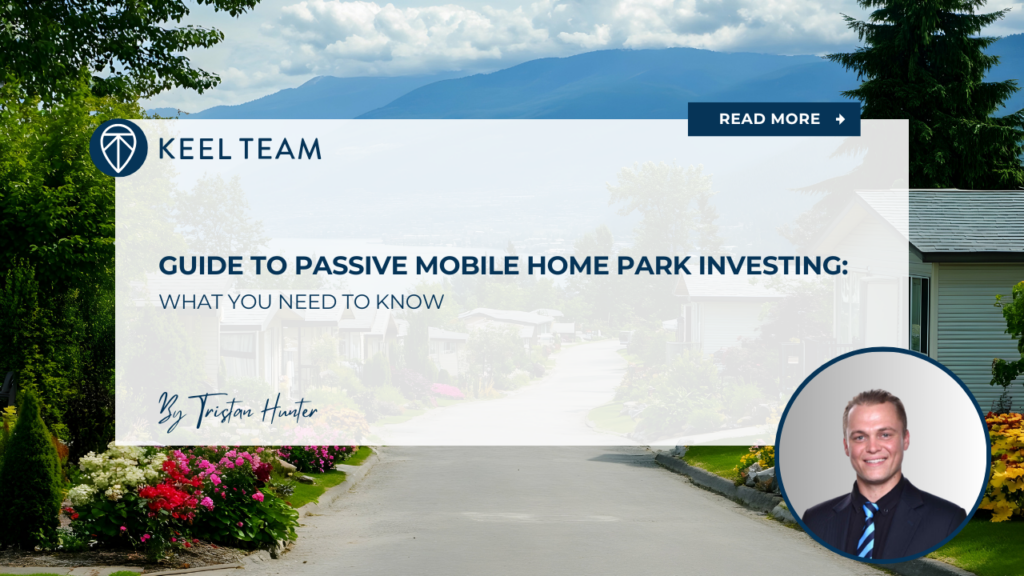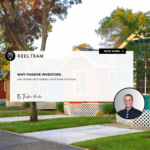Guide to Passive Mobile Home Park Investing: What You Need to Know
-
 Tristan Hunter - Investor Relations
Tristan Hunter - Investor Relations

At Keel Team Real Estate Investments, we specialize in mobile home park syndications. Mobile home park syndications can offer a pathway for passive investors to explore this resilient asset class. With over 52 mobile home parks under management across multiple states, we’ve developed a hands-off approach that prioritizes education and community enhancement. This guide explains our typical syndication model, highlights potential tax benefits, and outlines steps to understand passive mobile home park investing, drawing from our expertise in this space.
Why Investing in Mobile Home Parks is Popular?
Mobile home parks address the rising need for affordable housing, which can generate stable rental income. For example, our strategy focuses on acquiring value-add mobile home parks—often family-owned properties with room for improvement. Operating in states like Arkansas, Georgia, and Tennessee, we enhance these communities to improve resident experiences and aim for consistent returns for our investors.
Additionally, mobile home parks often feature lower operating costs and high occupancy rates compared to traditional real estate. Through syndications, investors may access these advantages without daily management responsibilities, making this asset class appealing for passive income seekers.
Download our FREE eBook on the Top 10 things to know BEFORE investing PASSIVELY in mobile home parks!
How Our Syndication Model Operates
We usually employ a 506(b) syndication model, compliant with SEC regulations, requiring a pre-existing relationship with investors. Here’s how it works:
- General Partner (GP): We serve as the GP, managing acquisitions, operations, and strategic decisions. With over 3,350 lots under management, our experience typically drives efficiency.
- Limited Partner (LP): Investors act as LPs, contributing capital and sharing potential profits without operational duties. This role suits those seeking minimal involvement.
- Legal Structure: Typically, we form an LLC to shield the investment from potential risks.
For instance, the 506(b) model emphasizes private offerings, so we share opportunities with individuals we’ve established relationships with. Investors receive detailed documents outlining potential returns, risks, and value-add plans, ensuring transparency.
Potential Tax Benefits of Syndications
Mobile home park investments may offer tax advantages, enhancing their appeal. However, outcomes vary, and here are some possibilities:
- Depreciation: Investors might deduct asset costs over time, potentially lowering taxable income. For example, cost segregation studies can sometimes accelerate depreciation.
- 1031 Exchanges: By reinvesting property sale proceeds into a syndication, investors may defer capital gains taxes, as explored in our podcast with 1031 expert Dave Foster.
- Pass-Through Deductions: Syndications may pass through expenses like interest or operating costs, potentially reducing tax liability.
Since tax rules are complex, consulting a tax professional is essential and highly recommended.
Hands-Off Management Approach
Generally, our management model simplifies investing by removing operational burdens. Specifically, our in-house team handles:
- Resident Satisfaction: We prioritize quality living conditions to sustain high occupancy.
- Operational Efficiency: Programs like utility bill-back systems aim to reduce expenses.
- Value-Add Execution: Upgrading older mobile home parks often boosts asset value and cash flow.
Consequently, investors avoid tasks like tenants, toilets, and trash.
Steps to Understand Passive Mobile Home Park Investing
Interested in mobile home park syndications? Here’s a step-by-step guide to learning the process:
- Explore the Asset Class: Start with resources, like the Passive Mobile Home Park Investing Podcast.
- Build Knowledge: eBooks, research, webinars, and social media groups might help.
- Learn the Model: Understand the 506(b) structure and its requirements for pre-existing relationships, per SEC rules.
- Review Deals: Study sample offering documents (shared through relationships) to assess properties, markets, and potential returns.
- Conduct Due Diligence: Research the operator’s track record.
- Consult Advisors: Engage financial and legal professionals to evaluate risks and goals.
- Stay Informed: If you proceed, expect quarterly updates to track performance.
This framework encourages thorough education for informed decisions.

What Makes Syndications Unique
Mobile home park syndications differ from other passive investments, like REITs or funds, in several ways:
- Direct Ownership: Unlike REITs, syndications offer fractional ownership in specific properties.
- Potential for Higher Returns: Value-add strategies may outperform REITs, though liquidity is often lower.
- Aligned Interests: As the GP, interests are usually aligned with the goals of our LPs, fostering accountability.
However, syndications generally require higher minimum investments and carry potential risks like market shifts. Therefore, diligent research is critical.
Our Portfolio and Expertise
Spanning over 52 mobile home parks, our portfolio reflects our expertise in this niche. For instance, we target value-add opportunities in high-demand regions, like our Southeast Michigan portfolio, which highlights operational success. By deploying staff to new acquisitions, we drive rapid improvements and upgrade our communities.
Additionally, led by Andrew Keel, our team leverages deep industry knowledge featured on top real estate podcasts. Strategies like filling vacant lots and optimizing management aim to enhance asset value and investor returns.
Is Passive Mobile Home Park Investing the Right Path for You?
Mobile home park syndications can offer a compelling way to explore passive real estate investing, particularly for those seeking hands-off opportunities with potential passive income and tax benefits. For example, this approach may appeal to busy professionals, retirees, or investors looking to diversify beyond traditional stocks or rental properties. The hands-off nature and professional management typically allow investors to focus on their broader financial goals without managing tenants or maintenance. Remember, due diligence on an operator is KEY!
Are you looking for MORE information? Book a 1-on-1 consultation with Andrew Keel to discuss:
- A mobile home park deal review
- Due diligence questions
- How to raise capital from investors
- Mistakes to avoid, and more!
Disclaimer:
The information provided is for informational purposes only and is not investment advice or a guarantee of any kind. We do not guarantee profitability. Make investment decisions based on your research and consult registered financial and legal professionals. We are not registered financial or legal professionals and do not provide personalized investment recommendations.

Tristan Hunter - Investor Relations
View The Previous or Next Post
Subscribe Below 👇




